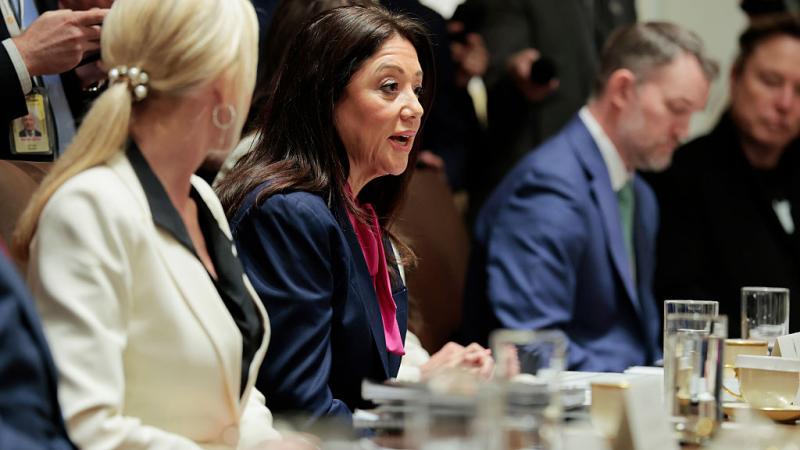Scientists working with Fauci, Collins struggle to explain emails to 'disprove,' 'refute' lab leak
Coauthor of "proximal origin" paper in Nature Medicine worried about "sh** show" from China if evidence showed "even accidental release" of SARS-CoV-2.
Twenty-five years ago, President Clinton gave a bespoke definition of the word "is" to claim he did not lie to a grand jury about his sexual relationship with White House intern Monica Lewinsky.
The lead author of a highly influential COVID-19 origins paper dismissing the plausibility of the lab-leak theory similarly struggled to convince House Republicans that his words "about" and "disprove" did not show that high-ranking federal officials covertly contributed to the paper or that its conclusion was politically driven.
The Select Subcommittee on the Coronavirus Pandemic on Tuesday published emails and Slack messages from early 2020 among coauthors of the "proximal origin" paper, as well as transcribed interviews with four of them, which allegedly show the "undue influence" of Francis Collins and Anthony Fauci, then the directors of the National Institutes of Health and National Institute of Allergy and Infectious Diseases, respectively.
"While it is true that the scientific method consists of raising a hypothesis, and then testing that hypothesis – often through falsifiability," it is neither true nor "appropriate to make definitive conclusions based on a falsification process riddled with assumptions," subcommittee Chairman Brad Wenstrup (R-Ohio) said at Tuesday's hearing.
Three participants on a Feb. 1, 2020 conference call to discuss SARS-CoV-2's unusual genome – Collins and foreign scientists Ron Fouchier and Andrew Rambaut, a coauthor of the paper – "all expressed concerns that the lab leak theory, if verified, would have significant international political implications – particularly for China," Wenstrup said, referring to written materials.
Rambaut, for example, told the coauthors it would cause a "sh** show … if anyone serious [sic] accused the Chinese of even accidental release."
The search for whether the virus was leaked from a lab, and from which lab that might have been, has centered on the Wuhan Institute of Virology.
Collins groused to Fauci April 16, a month after Nature Medicine published the paper, that "this very destructive conspiracy" of lab-leak was still considered viable and asked what "more we can do" to "help put down" the theory.
This "clearly insinuated that the NIH had previously taken steps" against lab-leak, according to the GOP subcommittee report, though Wenstrup said it wasn't clear whether Collins was referring to their role in the paper. The next day Fauci publicly promoted the paper at a White House press conference.
Scripps Research Institute immunologist Kristian Andersen told Fauci a day before the Feb. 1 call, which also included Fauci, that SARS-CoV-2 looks "potentially" engineered and that fellow experts also "find the genome inconsistent with expectations from evolutionary theory" if it had indeed arisen naturally.
His email thanking Collins and Fauci for their "advice and leadership" during the paper's drafting was disclosed last year.
Andersen told the subcommittee Tuesday that lawmakers didn't understand the jargon of his emails about the research team's drafting of the paper.
"Our main work over the past couple of weeks has been focused on trying to disprove any type of lab theory," Andersen wrote Feb. 8 to participants in the Feb. 1 call, which he said Tuesday might have included Lawrence Tabak, now acting NIH director.
"Disprove" refers to the scientific process of "falsification," not a predetermination against lab-leak, Andersen said in written testimony and in back-and-forth with lawmakers Tuesday.
Robert Garry, another coauthor who testified, claimed he was playing "devil's advocate" in an email before the Feb. 1 call flagged by Rep. Debbie Lesko (R-Ariz.).
Andersen emphasized the "international team" behind the paper could not all receive a "quid pro quo" from NIH officials, as claimed in an online "kill list" that names them individually, and said Fauci encouraged him to write a lab-leak paper if the evidence supported it.
When Nature Medicine senior editor Clare Thomas asked him about new pangolin sequence data during the review process, however, Andersen responded Feb. 20: "Unfortunately none of this helps refute a lab origin" and the coauthors "really, really wish that we could do that."
The journal rejected the initial submission because of uncertainty about whether it would "feed or quash the conspiracy theories," Thomas told him. Both Andersen and Garry told the subcommittee during their transcribed interviews that Nature Medicine didn't like their openness, however slight, to lab-leak.
When Andersen sent Fauci and Collins the newly accepted but not finalized paper March 8, asking for "comments, suggestions, or questions about the paper," it was a "professional courtesy" rather than seeking their "editing and approval," which would be implied by the phrase "on the paper," he told the subcommittee.
This "hand waving and semantic sorcery" puzzled former Senate Finance Committee investigator Paul Thacker, who scrutinized Andersen's written testimony in his newsletter Tuesday.
Andersen's timeline of when Fauci and Collins were first given the paper is also contradicted by a Feb. 4 email from Jeremy Farrar, director of the Wellcome science charity and organizer of the Feb. 1 call, providing the federal officials a "very rough first draft" of the paper, according to Thacker.
"There is currently no consensus on how this virus came to be" among intelligence agencies, California Rep. Raul Ruiz, the top Democrat on the committee, emphasized at Tuesday's hearing, yet the subcommittee is "interrogating researchers" so the GOP "can push a partisan narrative" that inhibits experts from conducting "politics-free" investigations.
Rutgers University molecular biologist Richard Ebright, who testified on gain-of-function research last year, gave Ruiz a harsh assessment.
Subcommittee Democrats released their own report Tuesday "disproving" Republicans' interpretation of evidence, particularly the role of Fauci and Collins, whom Garry said "mostly just listened" during the call.
Last week, Ruiz invited Farrar to testify, an offer seconded by the GOP majority Tuesday. Wenstrup said they invited every coauthor but some declined, while coauthor Ian Lipkin has been "voluntarily cooperating" but couldn't make it Tuesday.
Wenstrup grilled Andersen and Garry about their discussion of pangolin sequences, which Andersen said resemble some "notable features" of SARS-CoV-2 including its "high affinity for human ACE2" receptors and furin cleavage site.
They admitted they knew of no evidence that pangolins were present at the Huanan wet market – which they believe the most likely source of the pandemic – and couldn't tell Wenstrup how pangolins could "swap genes" from 600 miles away in their natural habitat.
When Andersen claimed the furin cleavage site had never been used in experiments before, Wenstrup said he meant "nothing ever published." The chairman pointed to the EcoHealth Alliance's 2018 proposal to the Defense Advanced Research Projects Agency to fund the Wuhan lab to insert novel "receptor binding domains" into bats.
House Oversight Committee Chair James Comer (R-Ky.) pressed the scientists on how they can be sure SARS-CoV-2 was not purposely manipulated when they acknowledge lab techniques can do this without leaving a trace.
Andersen said he just meant it wasn't intended as a bioweapon, while Garry said he "maybe" went too far, saying "a scientist who is 100% certain of their conclusions is not a very good scientist."
Rep. Nicole Malliotakis (R-N.Y.) gave Andersen pause when she asked whether former Centers for Disease Control and Preventions Director Robert Redfield, a virologist who believes lab-leak is most likely, was a "conspiracy theorist."
That is "not really something I have thought about," he responded, claiming it was "perfectly reasonable" to consider the theory.
The Facts Inside Our Reporter's Notebook
Links
- bespoke definition of the word "is"
- published emails and Slack messages
- Nature Medicine
- GOP subcommittee report
- SARS-CoV-2 looks "potentially" engineered
- email thanking Collins and Fauci for their "advice and leadership"
- written testimony
- Robert Garry, another coauthor who testified
- newsletter
- Feb. 4 email from Jeremy Farrar
- Richard Ebright, who testified
- released their own report Tuesday "disproving"
- Ruiz invited Farrar to testify
- seconded by the GOP majority
- EcoHealth Alliance's 2018 proposal
- virologist who believes lab-leak is most likely















